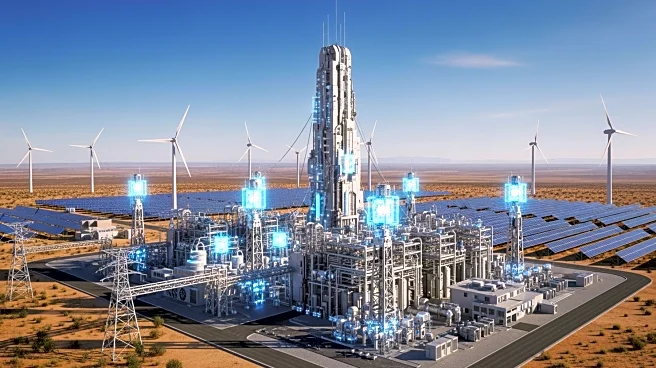What's Happening?
Chevron has announced its decision to establish its first natural gas-fired power project in West Texas, aimed at supplying energy to a data center. This marks a strategic move by the oil giant to tap
into the burgeoning demand for energy driven by the rise of artificial intelligence technologies. The company is currently in exclusive negotiations with the data center's end user, whose identity remains undisclosed, and plans to finalize the investment decision by early next year. The facility is projected to become operational by 2027, with an eventual capacity to generate up to 5,000 megawatts. Chevron, a major player in the Permian Basin, is leveraging its substantial natural gas production to support this venture, which is expected to initially produce 2,500 megawatts, equivalent to the output of two nuclear reactors.
Why It's Important?
The initiative underscores Chevron's strategic pivot towards integrating its energy production capabilities with the growing needs of the technology sector, particularly AI-driven data centers. This move is significant as it positions Chevron to capitalize on the increasing energy demands of data centers, which are being located closer to fuel sources rather than population centers. By utilizing its natural gas output, Chevron aims to secure a stable demand for its resources, potentially enhancing its market position and financial performance. The collaboration with Engine No. 1, an investor known for its activist campaign against ExxonMobil, further highlights Chevron's commitment to innovative energy solutions. This project could set a precedent for other oil majors seeking to diversify their operations in response to evolving energy consumption patterns.
What's Next?
Chevron plans to elaborate on its power strategy during its upcoming investor day, marking its first such event in nearly three years. The company anticipates growing its free cash flow by 14% annually over the next five years, reaching $30 billion by 2030, assuming Brent crude prices stabilize at $70 per barrel. Additionally, Chevron has maintained its buyback target at over $10 billion annually, with the potential to increase to $20 billion if Brent prices rise to $80 per barrel. The successful implementation of this project could encourage further investments in similar ventures, potentially influencing the energy strategies of other industry players.
Beyond the Headlines
Chevron's venture into powering AI data centers reflects broader industry trends where traditional energy companies are increasingly aligning with technological advancements. This shift not only addresses immediate energy demands but also positions these companies as integral players in the tech-driven future. The ethical and environmental implications of such projects, particularly concerning natural gas usage and emissions, will likely be scrutinized by stakeholders and environmental groups, influencing public policy and corporate strategies.








